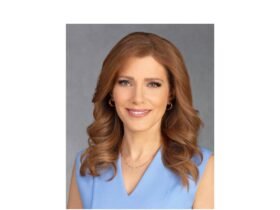Because understanding your money is important, but knowing how to talk about it with the people you love is life-changing.
We’ve all heard the phrase “money talks.” But when it comes to our actual lives, most of us aren’t talking about money at all — not with our partners, not with our parents, and sometimes not even with ourselves.
Instead, we’re stuck in silent spirals of stress, guilt, fear, and avoidance. That’s where financial therapy comes in.
In this week’s episode of the HerMoney Podcast, Jean Chatzky sits down with Erika Wasserman, certified financial therapist and author of: “Conversations With Your Financial Therapist,” to unpack the emotional side of money. They cover everything from childhood trauma to credit card guilt to why financial procrastination is almost never about laziness.
What Is a Financial Therapist, And Do You Need One?
Jean Chatzky: A financial therapist is one of those titles that makes people curious, but also a little confused. Can you explain what you do?
Erika Wasserman: Most people have never heard what a financial therapist is, and then once they do, I get the, “Oh wait, I need one, or somebody in my family needs one.” So we talk a lot about the dollars and cents investments, returns, how much things cost. But what I do is I talk about the other senses. How does money make you feel?
There’s an emotion that’s attached to money that we don’t talk about with ourselves, with our romantic partner, with their business partner, our employees, our aging parents. And what happens is it actually impacts both our health and our wealth, like a deep secret that we’re hiding.
Jean Chatzky: How do you know if you really need one?
Erika Wasserman: If you’re confident with your relationship with money, this isn’t for you. If you are uncertain, curious, or don’t understand some of your patterns or habits, or want to work on them, having a conversation with a financial therapist is an opportunity to learn and grow about your relationship to money.
The MONEY Method: 5 Steps for Better Money Talks
Jean Chatzky: You use something with your clients called the Money Mindset Method, and it’s a way to help guide yourself through financial conversations. Let’s go through it and explain to people how it works and how they might be able to use it to have a conversation of their own.
Erika Wasserman:
M is make the conversation comfortable:
It means the time of day, the tone. The temperature. The last time you had a productive conversation, where were you? Find the right time to make it comfortable because that’s gonna set the tone for a good conversation.
O stands for one by one:
Set a timer if you’re working with a partner. Write down over two minutes the questions that you have, and then you get to the end, which is nurturing shared goals. So when you look at your list of questions, what is something that is the same? What can you nurture and why is it important to both of you?
E is to evaluate practical solutions:
This is your big brainstorm. Let’s start thinking of things inside the box and outside the box. This is your opportunity to start brainstorming ideas because when we work together, we find out more information and come up with perhaps a better solution.
Y is yes to compassion:
Do this nicely, please. Do this nicely for yourself and do this nicely for the person who’s showing up. If you just had a hard conversation with your aging parent about bills, you might need to stop at the park and go for a walk. You also might need to take a deep breath and go get a glass of water. These conversations are uncomfortable because we haven’t done them. Having compassion and empathy really can shift that conversation to a positive light.
One Shift You Can Make Today
Jean Chatzky: Clearly, getting comfortable with the numbers is really, really important, but one of the themes that runs through your work is that so much of our money stress is not really about the numbers. It’s about the stories that we tell ourselves.
What’s one mindset shift that people can start practicing today that could change their relationship with money over time?
Erika Wasserman: Most of your listeners are women. We are great storytellers. So oftentimes we tell ourselves these crazy, amazing, sometimes beautiful, sometimes scary stories, but they’re not reality. Leave the storytelling to the authors, to the books you’re reading, and not to your finances.
MORE ON HERMONEY:
More money news when you need it! Get the latest and greatest updates on all things investing, budgeting, and making money. Subscribe to the HerMoney newsletter at Hermoney.com/subscribe!



















Leave a Reply